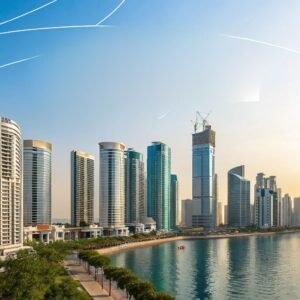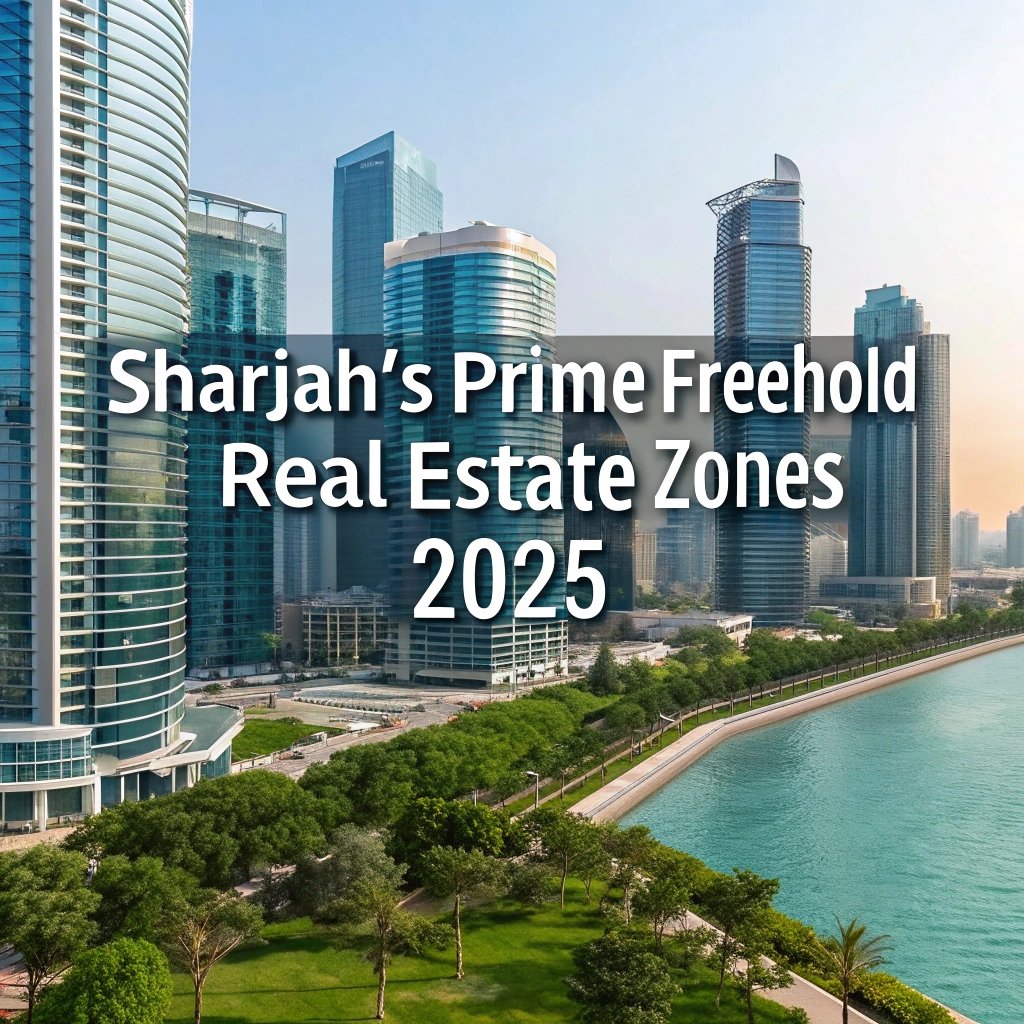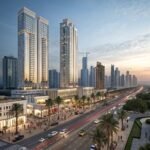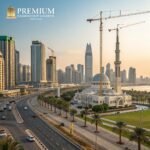Are you searching for a secure and profitable investment opportunity?
The landscape of property investment is constantly shifting, and finding truly solid options can feel like Guiding a complex maze. Many promises seem too good to be true, leaving many feeling lost and uncertain.
But what if there was a region offering unparalleled opportunities – one with streamlined regulations, attractive incentives, and significant growth potential?
Imagine owning property in a thriving commercial hub, generating passive income, and building long-term wealth. This isn’t just a dream; it’s the reality offered by Sharjah’s Freehold Zones.
Let’s delve into what makes these zones a game-changer for your investment strategy – specifically looking ahead to 2025 and beyond.
Sharjah Freehold Zones Explained
Thinking about Sharjah Freehold Zones as just another investment opportunity can lead you down a blind alley.
It’s easy to get caught up in the idea of quick profits from property, but these zones offer something far more strategic – long-term security and growth potential within the UAE market.
Simply buying land isn’t guaranteed success; developing it with a focused business strategy inside a Freehold Zone unlocks significant returns that passive investments often miss.
The key lies in understanding how these zones provide ownership rights, facilitating trade, and fostering businesses within a thriving economic environment.
Time spent researching basic property values is time not spent exploring the specific advantages each zone offers – from manufacturing to retail and beyond.
But here’s what isn’t widely discussed: these zones aren’t just about owning land; they’re about building a business that thrives within a regulated, supportive ecosystem.
Let’s dive into exactly how this blueprint can shape your 2025 investment strategy.
Zone Definitions & Types
If zone definitions and types are key to understanding Sharjah Freehold Zones, it’s about recognizing the different categories available.
There are primarily three main zones: The Commercial Zone, The Industrial Zone, and The Residential Zone. Each has distinct characteristics that dictate what kinds of businesses or activities can operate there.
The Commercial Zone is where you’ll find offices, retail outlets, and services – places designed for business operations. You’ll see things like banks, law firms, and marketing agencies calling this zone home.The Industrial Zone focuses on manufacturing, warehousing, and related industries. It’s a hub of production and logistics.
And the Residential Zone is where you find housing developments, catering to residents seeking places to live.
Within each of these broad categories, there are further subdivisions or ‘types’. For example, within the Commercial Zone, you might have specialized zones geared towards technology companies or luxury brands.
The Industrial Zone could include zones specifically for automotive manufacturing or electronics production. The Residential Zones can vary from low-density family communities to high-rise apartment complexes.
Understanding these zone definitions and types is crucial because they determine the regulations, permits, and overall suitability of a business or investment within any particular Sharjah Freehold Zone. It’s about finding the right fit for your needs – whether that’s setting up an office, launching a manufacturing operation, or buying a home.
Strategic Investment Landscape
You’re considering Sharjah Freehold Zones for 2025 – that’s a smart move. Let’s talk about building a strategic investment landscape around these areas.
The key here is understanding how each zone offers distinct opportunities. Some zones focus on commercial properties, offering potential returns through retail and office spaces. Others lean towards residential development, presenting chances for investment in apartments and villas. Recognizing this diversity is crucial to your planning.
The government’s push toward economic diversification within the emirate has driven significant growth across these zones. This expansion creates a fertile ground for investors seeking long-term gains – particularly as Sharjah continues to attract international businesses and residents.
Unlike investing solely in established markets, Sharjah Freehold Zones offer a chance to capitalize on emerging trends within the UAE’s rapidly developing real estate sector. It’s about identifying growth potential before it becomes mainstream.
Thinking strategically means researching specific zones based on projected demand – considering factors like tourism development, infrastructure projects and population growth. Analyzing these elements helps you pinpoint areas with strong upside potential for your investment. Careful due diligence is absolutely essential to securing a successful outcome.
Regulatory Frameworks & Shifts
During regulatory frameworks & shifts within Sharjah Freehold Zones, you’ll notice a continuous evolution designed to bolster investment confidence.
This involves adjustments to existing laws – think zoning regulations, property rights, and operational procedures – all aimed at streamlining processes for businesses.
For example, changes have been made regarding foreign ownership percentages in specific sectors, previously a key area of concern. These shifts demonstrate a proactive approach by the government.
You’ll also observe adjustments to licensing requirements – often becoming more streamlined and digitally driven – reducing administrative hurdles for new ventures.
This means less time spent Guiding bureaucratic complexities, allowing you to focus on core business operations. It’s a deliberate effort to create a more welcoming environment.
Ultimately, these regulatory shifts are intended to foster long-term investment and sustainable growth within the Freehold Zones – providing a stable foundation for your future ventures.
Land Value Trends 2025
People are increasingly recognizing Sharjah’s freehold zones as a key element in their 2025 investment blueprint.
Land value trends across these zones point toward significant growth over the next few years. This is largely due to ongoing infrastructure development and increasing demand for commercial properties.
Specifically, areas near the new airport are seeing a notable uptick in land prices – estimates suggest a 15-20% increase by 2025 if current trends continue. Similarly, zones with access to major highways are also experiencing strong growth potential.
Analyzing these trends requires considering several factors: population growth within Sharjah, the expansion of key industries, and ongoing government initiatives designed to attract foreign investment.
For example, the continued development of logistics and manufacturing sectors is driving demand for warehousing and industrial land – boosting prices in those specific zones. Furthermore, planned residential developments are also contributing to overall land value appreciation.
Therefore, understanding these evolving land value trends is crucial for anyone considering a strategic investment within Sharjah’s freehold zones as you plan your 2025 portfolio.
Emerging Sector Opportunities
Within Sharjah’s Freehold Zones, emerging sector opportunities present a compelling landscape for investment in 2025. You’ll notice significant potential growth concentrated around technology-driven industries and sustainable development projects.
Specifically, sectors like advanced manufacturing – including robotics and automation – are poised to benefit from the zone’s strategic location and supportive infrastructure. There is a growing demand for specialized components and services, offering substantial investment returns.
Furthermore, opportunities exist within renewable energy solutions, particularly solar and wind power generation, aligning with the UAE’s commitment to sustainability. The government’s incentives and favorable regulations create an attractive environment for businesses in this sector. You might also consider logistics and supply chain management – given Sharjah’s position as a key trading hub – there is potential growth in warehousing and distribution services.
Risk Assessment & Mitigation
So, Guiding the world of freehold zones in Sharjah requires careful consideration – particularly when it comes to understanding potential risks.
This is because property investments always carry some level of uncertainty, and Sharjah’s freehold zones are no exception.
Market fluctuations, regulatory changes, and even unforeseen development projects can impact the value of your investment. It’s crucial to acknowledge these potential downsides upfront.
To mitigate these risks, a thorough risk assessment is absolutely essential before you commit. This process involves identifying what could go wrong and then planning how to lessen those impacts.
You should start by researching the specific zone – its development plans, zoning regulations, and potential infrastructure projects. Understanding the surrounding area’s growth trajectory is also key. Diversifying your portfolio across different zones can further reduce risk.
A proactive approach to risk assessment, combined with diligent monitoring of market trends, will empower you to make informed decisions and safeguard your investment in Sharjah’s freehold zones.
Investor Due Diligence Checklist
While exploring Sharjah Freehold Zones for investment, it’s crucial to approach this process with a detailed checklist. This ensures you’re making informed decisions and minimizing potential risks.
Firstly, thoroughly examine the zone regulations – these dictate what types of businesses are permitted and any specific operational requirements. Understanding these rules is key to ensuring your investment aligns with the zone’s objectives.
Dig into zoning maps and confirm that your intended business activity is explicitly allowed within the designated area. Don’t assume— verification is paramount.

Next, assess the financial stability of the Freehold Zone itself. Look at its economic drivers, diversification efforts, and any government support programs.
Review recent reports on growth rates, foreign investment figures, and overall market trends within that zone. A stable zone provides a stronger foundation for your investment.
Don’t forget to scrutinize the legal framework – this includes understanding property ownership rights, dispute resolution mechanisms, and any associated taxes or fees.
Consult with legal professionals specializing in Freehold Zone regulations to gain clarity on these aspects before committing to an investment.
Essentially, a robust investor due diligence checklist – encompassing regulatory review, financial stability assessment, and legal framework scrutiny – provides the foundation for a successful Sharjah Freehold Zone investment.
Financing & Legal Considerations
As financing options become clearer for Sharjah Freehold Zones, understanding the legal landscape is just as crucial. Let’s explore what you need to know about securing funding and ensuring your investment remains protected.
Firstly, consider the various financing avenues available – from traditional bank loans to private investors and Sharia-compliant options. Each comes with its own set of terms and conditions that you should carefully review.
Banks typically require a substantial down payment and assess your creditworthiness thoroughly. Private investors might offer more flexible terms, but often demand higher returns. Exploring these avenues will help you find the best fit for your needs.
Guiding the legal framework is equally important. Freehold zones operate under specific regulations that govern property ownership, development, and operation.
You’ll need to ensure all transactions are properly documented with a legally binding agreement drafted by an experienced real estate lawyer. This will safeguard your rights and minimize potential disputes down the line. It is important to understand the zone’s specific regulations regarding foreign ownership, permits, and zoning restrictions.
Therefore, combining strategic financing with robust legal oversight provides you with a solid blueprint for success within Sharjah Freehold Zones – ensuring both financial stability and long-term asset protection.
Property Management Strategies
Imagine owning a property within one of Sharjah’s Freehold Zones – it’s more than just bricks and mortar; it’s about strategic control.
Effective property management is key to maximizing your investment’s potential, especially in these dynamic zones. This involves proactive steps to maintain value and generate income.
Regular inspections are crucial— ensuring everything from structural integrity to landscaping upkeep is addressed promptly. A well-maintained property always commands a higher market price. Consider engaging a reputable local firm for routine checks and repairs.
Think about tenant relations, if your property is generating rental income – clear communication and swift response times are paramount.
Establishing transparent lease agreements and fostering positive relationships with tenants can minimize disputes and ensure consistent occupancy. Regular maintenance requests handled efficiently show you’re invested in their experience.
Ultimately, smart property management within a Sharjah Freehold Zone isn’t just about covering costs; it’s about building long-term value and securing your financial future.
Zone-Specific Growth Drivers
Thinking about Sharjah Freehold Zones, it’s clear that different zones aren’t created equal when it comes to investment potential. Each zone has its own unique drivers pushing growth forward.
For example, the Commercial Zone is primarily fueled by the demand for office space and retail outlets – a natural consequence of Sharjah’s expanding business sector. The Logistics Park Zone benefits from being strategically located to facilitate trade throughout the region, making it ideal for warehousing and distribution businesses. And then there’s the Residential Zone, which thrives on providing housing options that cater to a growing population.
These differences stem from Sharjah’s overall economic strategy – diversifying beyond oil and gas into sectors like tourism, logistics, and real estate development. Each zone is positioned to capitalize on these specific growth areas.
You see this reflected in the types of businesses that are drawn to each zone; it’s not just about building anywhere – it’s about aligning investment with a targeted market need.
Understanding these zone-specific growth drivers is really key for anyone considering an investment here. It means carefully assessing where your business best fits within Sharjah’s evolving economic landscape, rather than simply chasing the highest potential return in one area.
Long-Term ROI Projections
Often, when considering Sharjah Freehold Zones, projections for long-term returns are what truly excite potential investors. You’re looking at sustained growth – not just a quick spike – but a steady increase in value over time.
These projections hinge significantly on the continued development and diversification of Sharjah’s economy. The ongoing investment in infrastructure, particularly within areas like logistics and tourism, creates a ripple effect of demand for commercial properties.
For example, if you’re considering property near the new airport expansion, forecasts suggest rental yields could rise by 15-20% annually over the next decade due to increased business activity and visitor traffic. Or consider developments along the coastline – projections indicate significant appreciation driven by tourism growth.
Furthermore, Sharjah’s strategic location as a trade hub within the Gulf region plays a crucial role in bolstering long-term ROI. You benefit from access to key markets and established supply chains.
This translates into higher occupancy rates for commercial spaces and increased demand for residential properties catering to business professionals and families. These factors combine to create a robust foundation for sustained investment growth – a picture of strong potential returns that you can build on.
Ultimately, the long-term ROI projections for Sharjah Freehold Zones aren’t just about numbers; they’re about building a secure financial future through strategic property investments in a dynamic and growing market.
Guiding the Investment Cycle
The key to Sharjah Freehold Zones lies in understanding where you fit within their investment cycle.
Initially, many investors look for immediate returns – quick gains on property sales. But this isn’t sustainable long-term. It’s about building a foundation.
Think of it like planting a tree: short-term yields aren’t the goal; you need to nurture its growth over decades. This means carefully selecting properties with potential for appreciation and strategic development.
The investment cycle in these zones involves several stages – acquisition, stabilization, value addition, and finally, sale or rental income generation.
Acquisition is the first step; then you’ll need to assess the property’s potential for improvement— renovations can increase its value significantly. And remember, a well-planned strategy will always lead to long term returns.
Therefore, Guiding this cycle successfully means focusing on long-term investment strategies and understanding the nuances of Sharjah’s Freehold Zones – a truly smart approach.
Building a Future That Feels Solid: Investing in Sharjah’s Freehold Zones
Smart investments rarely come knocking on your door; they require proactive exploration and strategic foresight.
Sharjah’s freehold zones represent a unique opportunity within the region’s burgeoning property market. These designated areas offer ownership rights, a significant advantage often absent in traditional leasehold arrangements. Demand for residential properties within these zones is consistently rising, fueled by Sharjah’s ongoing development and attractive lifestyle offerings. Holding onto this knowledge can truly elevate your investment portfolio.
Securing property within these zones isn’t simply about acquiring bricks and mortar; it’s about establishing a tangible asset with long-term growth potential. Early adopters are seeing substantial returns as the market matures, driven by increasing rental yields and appreciating values. Delaying investment means missing out on capitalizing on this dynamic trend.
Don’t let another year pass without considering Sharjah’s freehold zones. Research diligently, consult with experienced professionals, and seize the chance to build a secure financial future – a future built on solid ground in one of the UAE’s most promising investment landscapes.





Leave a comment